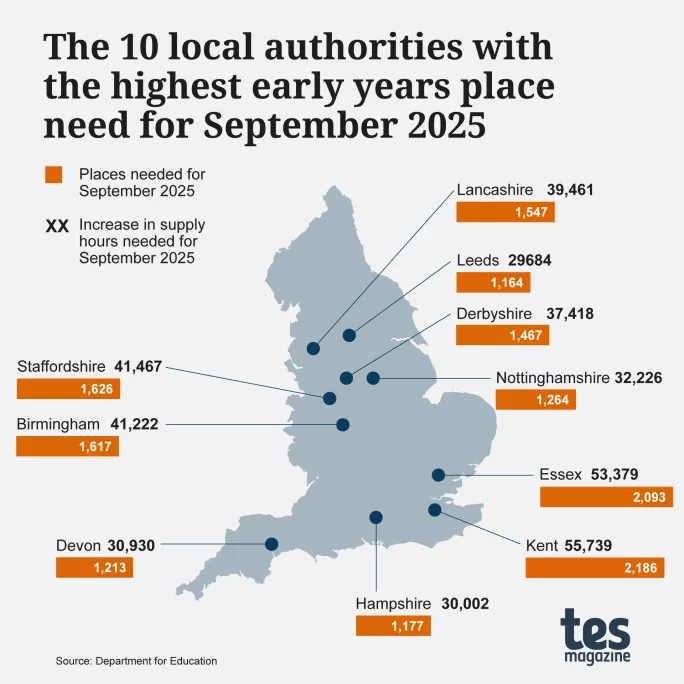- Home
- News
- Early Years
- Revealed: Areas most in need of extra nursery provision
Revealed: Areas most in need of extra nursery provision

The areas that need the largest nursery places expansion have been revealed by the Department for Education ahead of a commitment to increase provision by next year.
Some local authorities need to increase their capacity by 30 per cent or more by September 2025, including Sunderland, the Isles of Scilly and Cumberland, according to the DfE analysis, which has been released alongside guidance to schools on how they can apply for nursery expansion funding.
It shows that two local authority areas - Kent and Essex - will need to add more than 2,000 places for September 2025. Both of these areas need an increase in supply hours of more than 50,000 by next year, the DfE said.
The former chancellor announced last year that funded childcare hours would be extended to eligible working parents with children aged from nine months old. A phased rollout is currently under way before being offered in full from September 2025.
The DfE estimated that about 70,000 new places would be needed overall for autumn 2025 to meet this increased offer to parents, and about 35,000 additional staff.
Schools can now bid for nursery expansion cash
The department has published a breakdown of places needed by local authority, showing that 12 local authorities need to add more than 1,000 places by autumn next year (the 10 highest are shown on the graph below).

Meanwhile, the first round of capital funding has launched for schools to bid to convert spare space into nurseries.
Primary schools are now able to bid for up to £150,000 of the £15 million pot. It was previously announced that the first round of funding will support up to 300 new or expanded nurseries.
The government has urged schools to consider the data showing where there are gaps in supply when making bids and work closely with local authorities on proposals that outline a response to local need.
- Background: £15m for schools to open nurseries from next year
- EYFS: Could school-based nurseries work?
- EYFS: How underfunding hits learning
Funding is expected to be allocated to successful schools in the spring to ensure the delivery of places needed by September. Interested schools that are not yet ready to apply can register interest for future funding rounds, the DfE said.
Paul Whiteman, general secretary of the school leaders’ union NAHT, called for schools to be “well supported through this process, both practically and financially” and for a commitment from the government to “continue to focus on building a strong and sustainable early years workforce”.
Applications are open to state primary schools that already offer some early education, such as a Reception class. Guidance has been published this morning on eligibility and applying, as well as the requirements for opening a school-based nursery.
Projects must use surplus space in existing school buildings and should aim to be operational for the 2025-26 academic year - if longer is needed, schools are asked to justify this in the application.
Schools awarded capital funding as part of the programme must spend it by 31 March 2027 or risk it being clawed back. Those that apply are being urged to make sure their timeline for opening a school-based nursery includes time for a consultation if needed, relevant approvals, a procurement process and necessary surveys.
Bid assessors will consider several factors in choosing the successful schools, the DfE said.
Projects will score more highly if they are focused on “supporting children from disadvantaged families” and come from schools with “strong performance records”, the DfE guidance said, adding that the latter includes “good” or “outstanding” ratings in key Ofsted judgements.
Schools applying should be “confident there is, or will be, a need for additional early education places in the local area”, and should confirm this with their local authority, the guidance states.
The application window is open until 19 December. Maintained nurseries and special schools cannot currently apply but can register interest.
The education secretary Bridget Phillipson said new school-based nurseries “will provide thousands of additional places where they are needed most, plugging historic gaps and making sure geography is no barrier to high-quality childcare”.
More than 320,000 additional children are now accessing 15 hours of funded childcare a week, the DfE said. The full rollout of 30 hours a week to all eligible families will happen in September 2025.
For the latest education news and analysis delivered every weekday morning, sign up for the Tes Daily newsletter
Keep reading for just £1 per month
You've reached your limit of free articles this month. Subscribe for £1 per month for three months and get:
- Unlimited access to all Tes magazine content
- Exclusive subscriber-only stories
- Award-winning email newsletters



